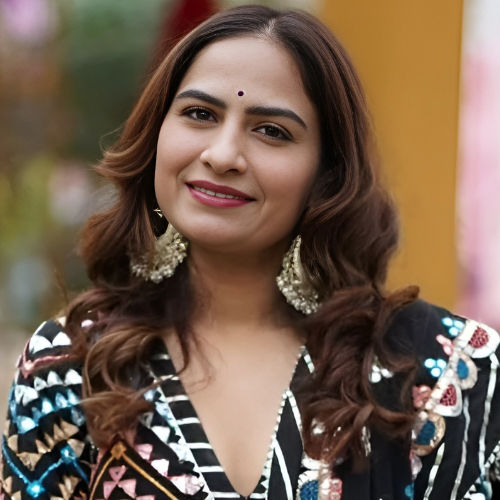
Archana Choudhary
Founder
Brand - Pomcha Jaipur
I focus on quality, not quantity
Archana Choudhary is an Indian fashion designer and founder of Pomcha Jaipur, an ethnic clothing label inspired by the colours, prints, and heritage of Rajasthan. The culture and heritage of Jaipur, where Chopra has lived since her childhood, impressed her, and are depicted in her designs. She began her journey with Pomcha in 2020 and is on her way to take the brand to new heights. In an interview with Fibre2Fashion, Chopra talks about her inspiration towards starting an ethnic wear brand, Pomcha’s background and future plans.
Fibre2Fashion: What inspired you to start an ethnic wear brand?
Archana Choudhary:
Living in the Pink City (Jaipur), I dreamt of becoming a fashion designer since the age of 15. When I enrolled as a fashion design student, like every student, I too dreamt of starting my own fashion brand. After completing my degree, I wanted to gain experience in my field by working, but due to some family issues, I couldn’t take up a job. So, I was sitting at home with a dream to start my own brand but had no experience. It is very difficult to start a brand from scratch, but my eagerness was so strong that I started thinking of a name for my brand. It took almost three to four months when one day, in my mother’s wardrobe, I saw a beautiful odhani/dupatta embellished with gotta patti embroidery and many colours. I asked her what it was, and she said ‘Pomcha’. And finally, I got my name, it was Pomcha. Pomcha is associated with the padma or lotus; it is a kind of veil/odhani. It symbolises purity, new beginnings, and love. Pomcha is given to the mother on the birth of her child, and it is also worn by brides in Rajasthan.
F2F: Can you provide some insight into the background and history of your brand?
AC:
After deciding the name, I was clear about the fabric that I wanted to work with—cotton with traditional handprint techniques and motifs. So, I started searching the market for fabrics and meeting handprint artisans. Living in Jaipur, which is the hub for handprint, bagru prints, and gotta patti embroidery, it was easy for me to find the experts. Once the fabric and designs were finalised, I started Pomcha in 2020 with an investment of just ₹20,000 and only 2 machines. Like every new home-grown business, I started uploading my designs on Instagram with the name Pomcha. As I started getting responses from customers, I kept increasing my SKUs. I had to dig deep and get into the nitty-gritty of the market to have a better understanding of the ever-increasing demand. From only four people in my team back then, today the strength has increased to over 100.
F2F: How do you go about sourcing materials and working with local artisans while maintaining product quality?
AC:
F2F: How do you balance the traditional and modern elements in your designs?
AC:
Clients want something new in their wardrobe every month, and when it comes to traditional attire, they do not want to repeat anything they have worn on previous occasions. So, keeping this in mind, I keep the attire traditional yet chic with embroideries like gotta patti, traditional textiles like hand-block prints but with modern twists in silhouettes.
F2F: What sets your ethnic wear brand apart from others in India?
AC:
Pomcha has beautiful designs made with innovative use of traditional crafts, distinctive use of colours, quality fabrics, and intricate embroideries. Our mission is to provide the latest in fashion, yet chic and traditional, that will make you feel exclusive, divine, and most importantly, yourself. Pomcha wishes to give women a sense of confidence by wearing attire that reflects the rich and royal culture of Rajasthan. Pomcha harmonises traditional silhouettes seamlessly with contemporary luxury.
F2F: Can you tell us about any notable collaborations or partnerships your brand has been involved in?
AC:
We have collaborated with many television actresses like Anushka Sen, Shraddha Arya, and Mouni Roy, among others, and received many compliments from celebrities. We have also received a good response from our clients.
F2F: What is your design process like, and how do you decide on the styles and patterns for your clothing?
AC:
While designing an outfit, firstly, I research the market to determine its needs and demands. Based on this research, I create a mood board for the collection. Then, I move on to textile design, which involves designing the patterns and motifs of the fabric that will be used for the outfit design. From hundreds of patterns and motifs, I select a few for my collection. My designs mainly consist of traditional Rajasthani motifs like paisleys, florals, phool jaal, and traditional textile techniques like hand block prints, bagru prints, bandhej, bandhani, etc.
F2F: How do you keep up with current fashion trends while still incorporating traditional Indian elements in your ethnic wear designs?
AC:
To survive in this competitive market, it is essential to conduct deep research on current fashion trends. At Pomcha, I ensure that my products meet the current fashion trends while still incorporating traditional elements. It is easy to launch a new collection when you research current fashion trends.
F2F: What kind of impact do you hope your brand will make on the fashion industry in India?
AC:
Mostly, I work with cotton fabric using traditional techniques and work with local artisans. My philosophy is to create conventional and precious forms of art that are crafted and rooted in the land of Indian royalties. The craft is woven with beautiful colours of the royal land. If any woman wants ethnic wear with a modern touch, Pomcha is the place to visit.
F2F: How do you ensure that your brand practices ethical and sustainable production methods?
AC:
When it comes to ethics and sustainability, we at Pomcha mostly use sustainable fabrics like 100 per cent cotton with a minimum price range for our outfits. We ensure transparency in the production process. Clients can visit our production unit to see our processes, from sourcing fabric to designing to final production. This builds trust, and customers know that we deliver what we promise.
F2F: What are your future plans for the growth and development of your ethnic wear brand?
AC:
For further growth, we will focus on our existing audience and offer them what they really want. We will expand our business to new territories, work on hand-painted and handwork designs, and launch bridal wear to expand our business and encourage more sales. We will also re-target our old audiences with new and more attractive designs.
F2F: What advice would you give to someone interested in starting their own ethnic wear brand in India?
AC:
If someone wants to start their own ethnic wear brand in India, I would advise them to conduct deep research on current fashion trends and focus on quality, not quantity. Your products should be sustainable, and your designs should be unique and wearable.

Anurag Batra
Fanny Vermandel
Gabi Seligsohn
Rahul Mehta
Aseem Prakash
Abhay Gupta
Rahul Mehta
Pradip Mehta
Bill D’Arienzo
Arun Sirdeshmukh


20230103183907.png)



_8.JPG)






